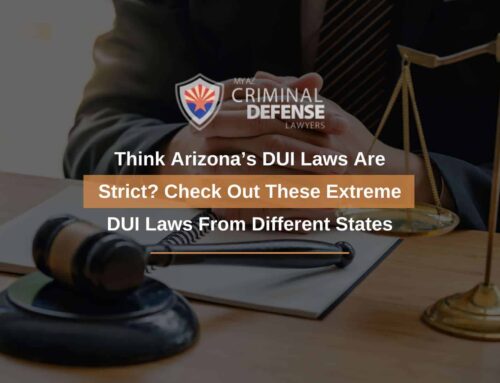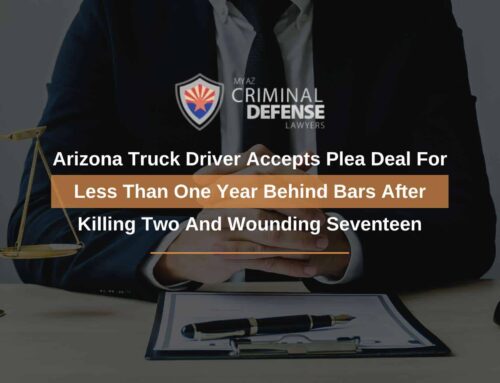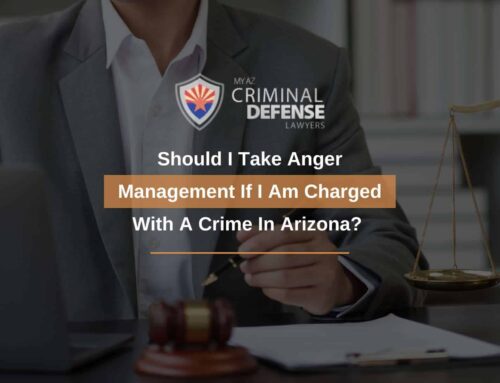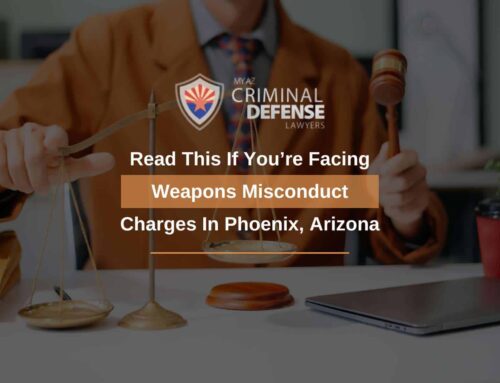Drunk & Disorderly Charges In Arizona
Unlike many states, Arizona does not have a specific law against public intoxication. This may be surprising, given Arizona’s strict stance on drinking and driving. But theoretically, when you’re in the Grand Canyon state, you can be as drunk as you want if you aren’t bothering anyone else. That doesn’t mean that you can be reckless and destructive. Certain intoxicated behaviors can qualify as an offense under Arizona’s disorderly conduct statute. Violating this statute is a misdemeanor offense, which is not as severe as a felony conviction, but can still have damaging and long-lasting consequences. It can also accompany other charges based on the circumstances under which the defendant was arrested. Stacked penalties can result in serious jail time, expensive fines, and a criminal record that could haunt you for life. Read on to learn more about being charged with drunk and disorderly in Arizona. If you’re looking for criminal defense representation in Phoenix or Tucson, contact our Arizona criminal defense firm for your free consultation at 480-833-8000.

Arizona Revised Statutes Section 13-2904
A.R.S. § 13-2904 is Arizona’s law for disorderly conduct. Although “drunk and disorderly” is a commonly used term, a defendant doesn’t have to be intoxicated to be guilty of this offense in Arizona. There are six definitions of disorderly conduct under Arizona law. The first five definitions are considered class 1 misdemeanor offenses, while the sixth is a class 6 felony. The six ways to commit disorderly conduct in Arizona are:
- Engaging in fighting, violent or serious disruptive behavior;
- Making unreasonable noise;
- Using abusive or offensive language or gestures in a manner likely to provoke immediate physical retaliation;
- Making any protracted commotion with the intent of preventing a lawful meeting, gathering, or procession;
- Refusing to obey a lawful order to disperse issued to maintain public safety in an emergency; and
- Recklessly handling, displaying, or discharging a deadly weapon or a dangerous instrument.
Defenses To Disorderly Conduct Charges
One key argument defendants can use to argue against a disorderly conduct conviction is that public intoxication is not a crime in Arizona. If the defendant was not actually engaging in disorderly conduct and was simply intoxicated in public, this can be a defense to the charges against them. Next, the defendant should attack whether or not a disorderly act actually occurred. It may take surveillance footage, eyewitness testimony, and other evidence to support the defendant’s version of events. Specific acts need to occur for conduct to become disorderly conduct, and the prosecution technically has the responsibility of proving this in court. However, a wise defendant will work proactively to attack any arguments they anticipate the prosecution might make.
Another avenue a defendant charged with disorderly conduct may want to try is constitutional defenses. Thanks to the 4th Amendment, police officers must have reasonable suspicion to investigate you for a crime, and probable cause to arrest you for it. The defendant can raise questions about whether these constitutional standards were met for their arrest. If the police can’t supply credible evidence to justify the arrest, the defendant might get their charges dropped or be found not guilty at trial. Achieving this kind of result in a criminal defense matter is a best-case scenario that doesn’t come with the implications of a conviction on your criminal record. Learn more about your defense options and discuss your case in detail with an experienced Arizona criminal defense attorney– schedule your free consultation today at 480-833-8000.
Should I Go To Rehab?
Attending rehabilitation treatment for drugs and alcohol can be a touchy subject, but it might not be optional if the defendant waits until after conviction to seek help for substance abuse. A defendant facing charges for any type of drug or alcohol offense should consider proactively seeking treatment. Some judges will be more lenient with defendants struggling with substance abuse if they are making an honest effort to do better. It can’t overturn a conviction, but it might convince a judge to issue penalties at the lower range of the guidelines. A skilled lawyer can help you assemble other evidence that supports your rehabilitation efforts. Putting effort into these details might help you avoid jail time with alternatives like probation or house arrest. Schedule your free time to speak with one of our skilled criminal defenders by calling 480-833-8000.
Arizona Misdemeanor Penalty Guidelines
Five of Arizona’s six definitions of disorderly conduct are charged at the misdemeanor level. When the judge is ordering penalties like fines and jail time, they are expected to stay within a certain range based on the level of the offense charged. In Arizona, a class 1 misdemeanor is the most serious type of misdemeanor offense, and class 3 is the least serious. Even less serious crimes are charged as petty offenses. Arizona’s statute setting forth misdemeanor sentencing guidelines is A.R.S. § 13-707. Misdemeanor defendants serve their time in state jails rather than prisons like convicted felons. Arizona’s statute setting forth fines for misdemeanor convictions is A.R.S. § 13-802. The maximums set forth by these statutes are as follows:
- Class 1 misdemeanor: 6 months incarceration, $2,500 fine
- Class 2 misdemeanor: 4 months incarceration, $750 fine
- Class 3 misdemeanor: 30 days incarceration, $500 fine
Related Offenses
Disorderly conduct is a criminal charge that often comes in addition to other alcohol-related offenses. Some of those include:
- Driving Under the Influence (DUI): Unless aggravating factors are present, DUI is charged as a misdemeanor in Arizona, although conviction carries mandatory jail time. When the substance in question is alcohol, it is unlawful to drive with a BAC of .08% or higher, although drivers in Arizona can be charged with DUI to the slightest degree for a BAC of .05% to .08%.
- Minor in Possession (MIP): Arizona’s statute for unlawful liquor acts is quite extensive, but most people are aware that it is illegal for a person under the age of 21 to possess or consume liquor. It is also illegal for any adult to sell or provide a minor with liquor.
- Trespass: A defendant commits trespass in Arizona by entering or remaining on someone’s property without permission. It is a class 1 misdemeanor unless committed in a critical public service facility, in which case it is a class 6 felony.
Invest In Yourself With Arizona’s Strategic & Experienced Criminal Defense Team
If you’ve been charged with one or more criminal offense in Arizona, it may feel like your life is in freefall. Drunk and disorderly charges are often accompanied by other criminal charges, as well as potential struggles with drug and alcohol dependency. Going to jail and paying hefty fines will probably only make your situation worse. That’s why you should consider your right to hire the criminal defense attorney of your choosing. If you don’t feel confident with the public defender assigned to your case, you can hire your own attorney so you can feel confident about your judgment day in court. Let an experienced member of our Arizona criminal defense team assess your case to see if we are the right fit for you. We fight tirelessly for our clients’ rights so they can move forward from legal troubles in a positive manner. Get started today with your free consultation by phone by calling 480-833-8000.

My AZ Criminal Defense Lawyer
Mesa Location:
1731 West Baseline Rd., Suite #100
Mesa, AZ 85202
Office: (480) 448-9800
Glendale Location:
20325 N 51st Avenue Suite #134, Building 5
Glendale, AZ 85308
Office: (602) 509-0955
Tucson Location:
2 East Congress St., Suite #900-6A
Tucson, AZ 85701
Office: (520) 441-1450
Avondale Location:
12725 W. Indian School Rd., Ste E, #101
Avondale, AZ 85392
Office: (623) 499-4222







